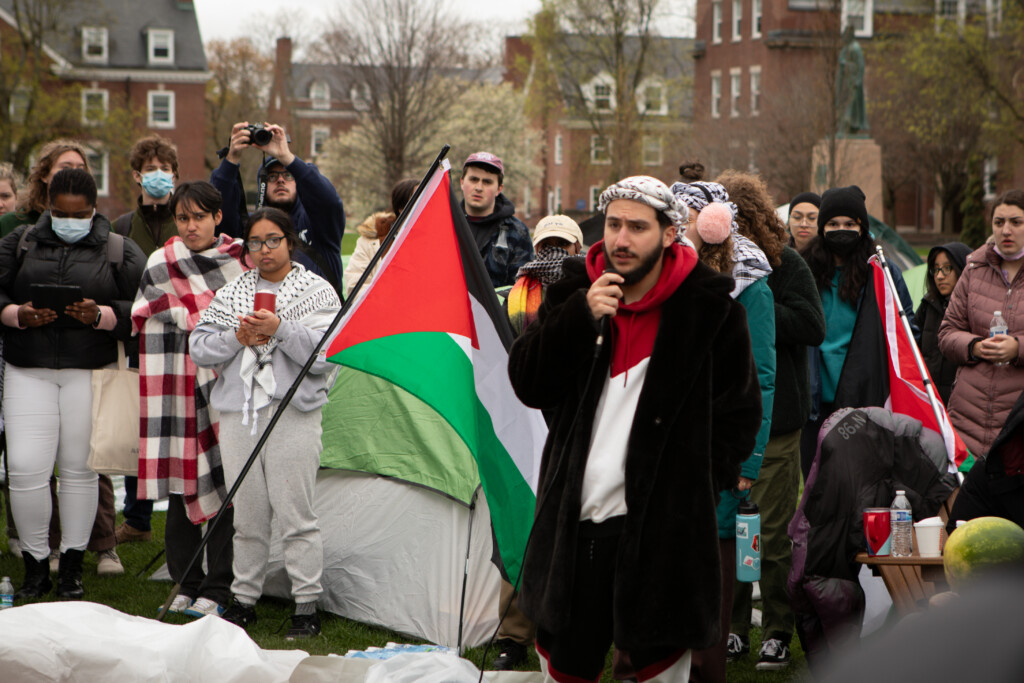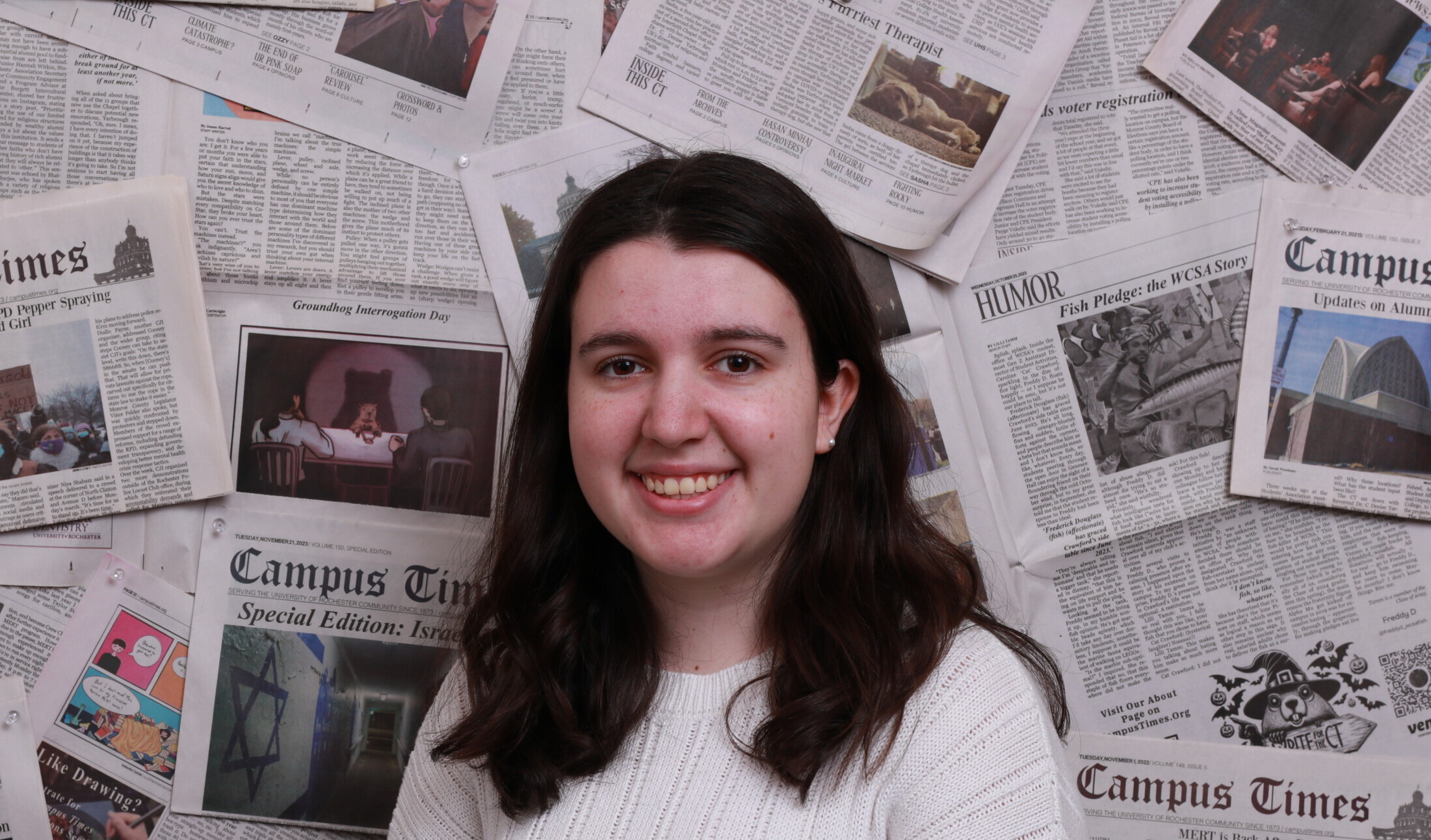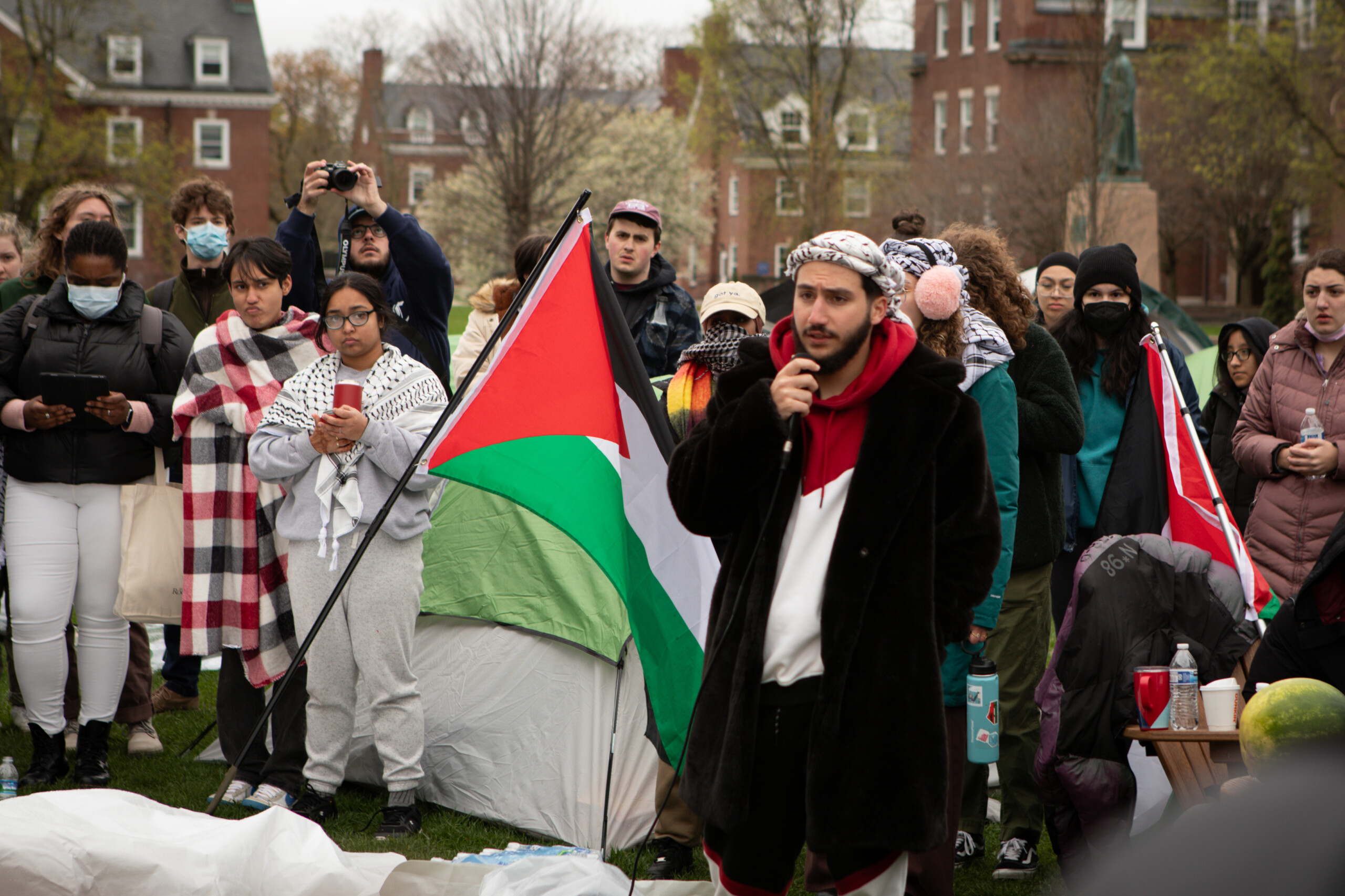Social media exploded Wednesday when, after meeting with administrators, UR Gaza solidarity encampment protesters announced that the process of academic divestment from Israel was underway at the University. Their Instagram statement garnered thousands of likes — it looked as though the Wilson Quad protesters got the ball rolling on one of their demands.
That was until Thursday, when University Communications issued a statement saying administrators made no commitment during the meeting to the protesters’ demands, that they “made clear” that the protesters’ demands were never on the table, and that “there has not and will not be any commitments about future academic divestment of University programs in Israel.”
However, the Campus Times obtained a recording of the meeting between the protesters and administrators. The protesters mischaracterized the certainty of the divestment process, but the University’s statement is also largely inaccurate. Administrators never ensured that academic divestment would be achieved, but they and founding Black Studies Department Chair Jeffrey McCune repeatedly laid out the pathway for the demand to be considered through the Faculty Senate.
Senior Laith Awad — a Students for Justice in Palestine organizer who attended the meeting alongside graduate student Halima Aweis, newly-elected SA President Elijah Bader-Gregory, and senior Andrés Arocho González — said that academic divestment would mean ending study abroad programs and research opportunities with Israeli universities until the war is ended, according to the recording.
Early in the meeting, administrators repeatedly described the Faculty Senate as a venue where a plan for academic divestment could be brought to the table, in contradiction with the University’s statement.
The Faculty Senate consists of the provost, president, dean of graduate students, and 45 faculty members elected by the faculty. Their role is to make recommendations about the University’s academic development and “any matter of an educational or administrative nature that has implications for the academic function and welfare of the University,” according to their website.
Provost David Figlio — who attended alongside Vice President for Student Life John Blackshear and Interim Dean of Students Anne-Marie Algier — said he “could imagine” the Faculty Senate “having a conversation through their committee process” about “the desirable parameters of academic interaction with Israel.” He then said that, once the Faculty Senate felt comfortable with their recommendations, he could “as chief academic officer, get involved talking with them,” and that they could “loop in the president [Sarah Mangelsdorf] at that point.”
“So if one of the things you’re hoping to accomplish would be to initiate […] you know, some conversations within the institution […] about that. I mean, you know, I think that it’s certainly totally reasonable,” he continued.
After Figlio spoke, Vice President for Student Life John Blackshear added that “the most powerful place to have that conversation and have the deliberation of the academy happen is in the faculty. The faculty run the University. They set all parameters.”
It is the Board of Trustees, however, that describes itself as “the governing body of the University.” They meet three times a year, and determine UR’s funding, purchases, investments, and more. There are currently 37 voting members, who are elected “from time to time by the Board of Trustees,” their bylaws state.
McCune, the co-chair of the Faculty Senate Executive Committee (SEC) who told the CT via email that he was invited to the meeting by the administration in his capacity “as a faculty leader and administrator,” agreed with Blackshear during the meeting and even said the Faculty Senate recommendation could be “sent forward to Sarah [Mangelsdorf] and to the Board [of Trustees].”
Blackshear added that he thought a recommendation from Figlio that the Board speak with the protesting students would have more weight than the students asking themselves.
Figlio insisted that the Board sets their own agenda. The only thing he could commit to was that he and Mangelsdorf would engage with a Faculty Senate recommendation. He then shifted the conversation to the administrators’ more immediate concern — whether the encampment would move for Dandelion Day.
“You have to make a decision. The University also has to make a decision about what to do,” Figlio said. “We don’t want bad things to happen to our students. And we also need to — Dandelion Day is going to happen.”
Awad pushed back, asking what would happen to protesters if the encampment did not move. Figlio did not specify, but he recommended the protesters move. Awad said they would be fine moving the encampment with only their academic divestment demand being met.
Figlio said the demand “can’t be met instantly,” seemingly implying that it could be met in the future, which is also in contradiction with the University’s statement. Figlio even described the protesters’ demand as a process that could take six months to a year, again implying that meeting the demand was on the table in the long run. In a statement to the CT sent Monday, UR Spokesperson Sara Miller said this was meant to communicate that “complicated topics where consensus may be hard to come by would necessarily take a long time to work through—six months, a year, or more.”
Blackshear then jumped in and advised the protestors to review the Faculty Senate’s deliberations as they were “taking this up” to ensure their voices are heard and that they understand how senators are thinking. He acknowledged a possibility that the Faculty Senate’s recommendations would be followed, using that as a basis for advising the students to get involved in the formation of the recommendations.
“I would hate to hear a promise being made is, ‘we’ll do whatever they say,’ and what if it comes back exactly the opposite of where you’re trying to go?” he said to the students.
McCune then guaranteed that he would initiate conversations about academic divestment with the Faculty SEC that same day. He also said in strong words, verbatim, that academic divestment would be “on the table” for the Faculty Senate. In an email to the CT the next day, McCune said he was not invited to the meeting in his role as the chair of the Faculty SEC even though he invoked the role several times during the talks.
“I can almost guarantee you, because of the nature of this, the SEC as I know it, as you know, will actually probably put this as an agenda item on the Senate next Tuesday. So next Tuesday there will be on the table something regarding this particular issue,” he said.
When asked to comment on his statements in the meeting, McCune told the CT Monday that he would begin discussions in his capacity as co-chair if a proposal from the Faculty Senate had come forth. He also told the CT that there was no plan that had been approved and no plan before the SEC or Faculty Senate at the time of the meeting.
“All of what I said, as to prospects for the divestment discussion, was with the assumption that a proposal was coming forth,” he said.
SA President Elijah Bader-Gregory then acknowledged that the students knew that meeting the protesters’ demands would take time before McCune cut in to describe the moment as “the start of something.”
Blackshear later ensured that McCune “will make sure that we [the administration] take very seriously what the Senate executive is saying.”
The recording ended shortly thereafter when Figlio left to rush to an Academic Affairs Committee meeting for the Board of Trustees, which McCune also later attended and which Blackshear was supposed to attend.
After reviewing the recording, the CT reached out Monday to the three administrators who attended the meeting for comment on the contradictions between their comments and the University’s official April 25 statement. UR Spokesperson Sara Miller sent a joint statement in response.
“The University of Rochester has not considered and is not open to discussing an end to its academic involvement with Israeli institutions,” the statement reads. “This will not stop some stakeholders from requesting divestment from institutions outside of the United States, and the University will not punish students solely for respectfully requesting this, but the University’s position on this is clear.”
Miller’s statement to the CT also walked back elements of the University’s earlier public statement.
“The April 24 meeting with the student protest leaders was intended to find mutual understanding on some ongoing divisions. It became—perhaps unclearly—a discussion on how University processes work and the steps that would be needed to introduce a proposal such as academic divestment to the Faculty Senate for consideration,” the statement reads, in contrast to the April 25 statement which said administrators “made clear that neither demand was on the table.”
“University leaders who were part of the April 24 conversation recognize that there may have been misinterpretations of the meeting’s outcome,” Miller’s statement to the CT also said.
McCune also sent his reflection on the meeting to the CT:
We had about a 20-25 minute meeting, where as a faculty member who was fearful of student disciplinary action—and who believed there was a misunderstanding that the [U]niversity had no clear process to address their concerns—I felt clarity was needed. To verify there was a step-by-step process, I shared the stages by which any proposal could be considered. In retrospect, I think I should have been clearer that one of my frustrations has always been that proposals or recommendations brought before the Senate, require multiple kinds of oversight before [U]niversity action.
After Wednesday’s meeting, the protesters returned to the encampment, and brought McCune with them. After a long talk in a tent, they emerged, and Awad made an announcement to the crowd of roughly 70 protesters.
“By next Tuesday, we’re gonna know that if the faculty executive senate is going to move forward with this, which, right, more likely than not, they will because they’ve been supportive,” Awad announced to the crowd. “By May 16, the Board of Trustees is going to have a meeting where this is going to be brought up. By May 16, we’re gonna know if the University of Rochester will cut all ties with all Israeli universities, study abroad programs, and research opportunities until they stop the occupation.”
His announcement reflected undue certainty about Faculty Senate recommendations being brought up at the Board of Trustees meeting, but it accurately reflected McCune’s guarantees during the meeting about the Faculty Senate process.
McCune later told the CT that he meant to guarantee that he would begin discussions if a proposal came forth, but that “surely does not guarantee that any such proposal will be successful at any stage of discussion.” He highlighted that the Faculty Senate sometimes takes up positions that are at odds with the administrative opinion.
“The Faculty Senate is a self-governing body and is free to address whatever topics they want to discuss relevant to the University’s academic activities,” Sara Miller told the CT. “Senate resolutions can serve as recommendations to be considered by the University but are not the University’s position.”
The protestors also later released a statement on Instagram: “After a meeting with administration earlier today, we have successfully initiated the process of academic divestment. We will keep you all updated as things progress.”
With the process seemingly initiated, the protesters moved their encampment to Eastman Quad as a “compromise,” as Awad put it, so Dandelion Day could go on uninterrupted. He said they had only received permission to relocate to the field behind the Goergen Athletic Center or the base of the hill behind Susan B. Anthony Hall, but they opted for Eastman Quad to keep their protest central to the campus.
“We will keep staying there until our first demand is met,” Awad said to applause and whoops.
Contractors quickly hauled carnival equipment onto the encampment’s former location. The next day, University Communications released their aforementioned April 25 statement, which said:
University leaders need to provide clarification on the details of a meeting yesterday between student protesters and University administrators regarding protester demands. The students were demanding (1) a cease-fire call and (2) divestment from Israeli institutions. University administrators in fact made no commitment to either demand, but in particular made no commitment regarding a University divestment from any academic programs or ties with Israel, as is being inaccurately reported on some social media channels. University administrators made clear that neither demand was on the table. There has not and will not be any commitments about future academic divestment of University programs in Israel.
On Friday, while some students filed into food truck lines and crammed into carnival rides, the protesters rallied on Eastman Quad and lambasted the statement.
“They say no commitment to divestment was ever made, yet we hold onto the conversations, the assurances given that painted a different picture — one where divestment was not only possible, but was on the horizon,” Awad said.
Editor’s Note: Read our Israel-Palestine reporting disclosures here.



